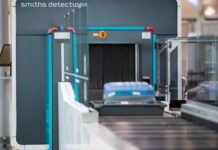
The Danish Superliga football club Brøndby IF were aware that family attendance had fallen at some of the more high-profile games, such as the local derby with F.C. Copenhagen, due to concerns over hooliganism and safety. With an average attendance of 14,000 people per game, and up to 100 registered persons on the stadium blacklist for causing trouble, the football club wanted to find a way to make genuine fans feel safer by preventing problems before they could occur.
With the use of cameras and facial recognition, blacklisted offenders can now be automatically identified in the crowd before they attempt to enter the stadium. This system identifies any individuals registered on the offenders list and alerts security staff to prevent them from entering.
The automated procedure at the stadium entrance also decreases congestion at the gates, so genuine fans can get into the stadium faster. As well as improving security outside, the system allows staff more time to focus their attention on creating a safe and entertaining environment for those inside the stadium.
The Panasonic facial recognition software ensures high levels of accuracy. The technology can identify faces that are difficult to recognise with conventional techniques, such as those taken from an acute angle and even when part of the face is concealed or hidden by sunglasses or scarves.
In fact, the National Institute of Standards & Technology (NIST) in independent testing identified the system as the most accurate facial recognition server on the market. And the system is already working. One blacklisted offender was prevented from entering the stadium at the very first home game of the season in mid-July and he will receive a fine and extended ban.
However, some fans were initially sceptical about the scheme. They were worried about the Big Brother concerns of privacy and personal data protection. These fears quickly faded once the club explained the sensitive way that the scheme had been implemented.
Security personnel remain in control of the process at every stage. The technology flags potential blacklisted offenders and the security advisers then take over and investigate further before taking action.
The solution is people-led and technology supported. Personal data privacy is also protected because the facial recognition technology does not store the images or data of any supporters, other than those registered on the blacklist. In addition, all personal data is stored on an internal server, not connected to the internet or to any other system, significantly reducing any cyber risk of data breach. After seeing the results of the technology and receiving reassurances about data protection, both Brøndby management and fans alike have welcomed the new technology. Moving forward there is also the potential to utilise a national hooligan register with the system to help spot travelling troublemakers within Denmark.











